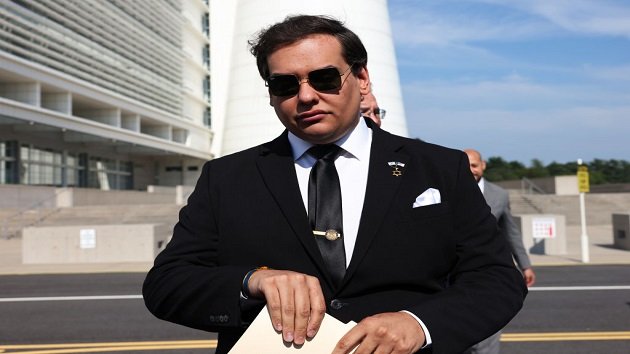WMEX Boston
Listeners:
Top listeners:
-
 play_arrow
play_arrow
WMEX WMEX Boston
-
 play_arrow
play_arrow
Courage To Hope-Episode 82-Michael Courage To Hope-Episode 82-Michael
What happens if Trump can’t secure a bond for his $464 million civil fraud judgment?
todayMarch 21, 2024

Former U.S. President Donald Trump and former first lady Melania Trump walk together as they prepare to vote at a polling station setup in the Morton and Barbara Mandel Recreation Center, Mar. 19, 2024, in Palm Beach, Fla. (Joe Raedle/Getty Images)
(NEW YORK) — Donald Trump has boasted that his assets include the “Mona Lisas” of real estate, but the former president risks losing some of those properties and unraveling his personal finances if he can’t satisfy the judgment in his $464 million civil fraud case by next week.
New York Attorney General Letitia James could ask the court to freeze Trump’s bank accounts, begin collecting rent from the tenants of his buildings, subpoena the former president for his personal financial information including tax returns, and request that the New York City Sheriff auction his trophy properties within months, according to multiple experts in the judgment collection industry who spoke with ABC News.
In a filing this week, Trump’s lawyers told the court that securing a bond for the full judgment was a “practical impossibility” after over 30 insurance companies declined to accept Trump’s cash and properties as collateral.
“If he does not have funds to pay off the judgment, then we will seek judgment enforcement mechanisms in court, and we will ask the judge to seize his assets,” James said in an exclusive interview with ABC News last month.
However, the process of enforcing the massive judgment would likely require navigating a maze of limited liability companies, constant roadblocks by defense attorneys and technical challenges — slowing the process of collecting from a former president one of the largest judgments in New York history.
“You can’t just say, ‘It’s Trump Tower, so I’m going to take it,'” said Steven Yudin, a New York judgment enforcement attorney. “I’m sure Donald Trump does not own Trump Tower in his own name; you would have to unravel that.”
Last month, Judge Arthur Engoron determined that Trump, his sons, and their co-defendants engaged in a decade of fraudulent business by inflating the former president’s net worth. Engoron temporarily barred Trump and his sons from doing business in New York and imposed a judgment of $464 million for disgorgement and pre-judgment interest. Last month, A New York appellate judge denied Trump’s request for a delay of the enforcement of the judgment but temporarily lifted the court’s ban on Trump and his sons running New York companies.
On Thursday, Trump defended the financial strength of his company and said his decision about posting a bond would be “guided by the courts.”
“Billions of dollars of value, billions of dollars in properties, but they’d like to take the cash away, so I can’t use it on the campaign,” Trump said, though his campaign has largely used funds from donors.
In a statement to ABC News, Trump’s attorney Chris Kise described James’ most recent filing in the case — where she suggested Trump secure multiple smaller bonds or put up his properties with the court — as a “brazen abuse of power.”
“The Attorney General’s latest filing demonstrates her continued willingness to misrepresent the facts and misconstrue applicable law in her political crusade against President Trump,” Kise said.
What happens if Trump can’t get a bond?
If Trump and his co-defendants are unable to pay the full balance of the judgment in an account with the court, secure a bond, or consent to have his buildings held by the court by Monday, the New York Attorney General could ask the court to enforce the $464 million judgment.
The process will likely be lengthy given the defendants and immense size of the bond, according to trial attorney Kevin O’Brien, especially if James opts to seize the former president’s properties.
“That’s going to be a long process, and it’s not going to happen overnight,” O’Brien said. “These properties are huge, they have debt … and they have tenants.”
James’ investigation of Trump revealed wide-reaching misrepresentations in the former president’s financial statements between 2011 and 2021. According to judgment enforcement attorney Peter Agulnick, James could attempt to get a fuller picture of the former president’s finances, including involving the Trump Organization’s independent monitor Barbara Jones.
“You could subpoena the judgment debtor and require him to give his tax returns and all sorts of documents concerning his financial condition and assets,” he said.
If Trump has money in savings or brokerage accounts, James could attempt to freeze those assets to satisfy a portion of the judgment, according to Steven Cohen, a New York attorney whose work includes enforcing judgments. James could also ask to impose restraining notices on the Trump Organization’s tenants so they pay rent to New York’s Sheriff’s office — and contribute to the judgment — rather than to the former president’s companies.
One challenge to the collection efforts could be the Trump Organization’s complex corporate structure, which creates a barrier between the defendants in the case — Trump, his sons, the Trump Organization, and the holding companies for some buildings — and the mechanisms that exist to collect judgments.
“People like him have a lot of layers of ownership, so it’s going to take some effort to unravel that and get his assets,” attorney Yudin said.
Could Trump Tower or Mar-a-Lago be seized?
James could ask the New York Supreme Court to force Trump to auction off his shares in his New York properties — such as Trump Tower or 40 Wall Street among others — through either a receiver or the New York City Sheriff.
“The more unique the asset, the more you probably want a receiver,” judgment collection attorney Kenneth Katz said. “A sheriff is not going to go out and try and find buyers; they’re just going to say, ‘Six weeks from now, we’re going to sell this building, anyone who is interested will show up.'”
While James could attempt to enforce the judgment through the sale of out-of-state properties, seizing a property like Mar-a-Lago would require additional steps like registering the judgment in Florida, and states often include restrictions on seizing a defendant’s personal residence.
“I’m going to assume they’re going to go to the New York properties first because that’s the easiest thing to do,” Cohen said.
In an interview with ABC News, James suggested Trump’s 40 Wall Street skyscraper — which neighbors the New York Attorney General’s Manhattan office — was a potential asset she could seize.
“We are prepared to make sure that the judgment is paid to New Yorkers, and yes, I look at 40 Wall Street each and every day,” James said.
The judgment collection process normally takes years or months, but the Trump case could also be expedited due to the high-profile defendants, according to Cohen. Trump’s lawyers are likely to attempt to stop the process along the way, potentially slowing the pace of the sales until after New York courts finish hearing Trump’s appeal.
“There are things to do to slow the process down. You’re always going to be met with roadblocks and resistance,” Yudin said.
Does Trump have enough money to pay the bond?
While the former president claims to be worth over $10 billion — largely due to his “brand value” — the exact amount of cash held by the president is unknown.
In a deposition last year, Trump claimed he has over $400 million in cash, and his statement of financial condition in 2021 listed that he had $294 million in cash and cash equivalents. Since that financial statement was issued, Trump profited $126 million from the sale of a Washington, D.C. hotel and $60 million from the sale of a New York golf course.
Trump could potentially make billions from his stake in the company behind his Truth Social social media platform, Trump Media & Technology Group — which is set to merge with Digital World Acquisition Corporation later this month — but Trump would not be able to sell those shares for at least six months.
Trump also faced similar issues securing a bond for his $83.3 million judgment in his defamation case.
In that case, the former president ended up using a brokerage account to collateralize a bond through the massive insurance company Chubb, but the company declined to issue a bond for the fraud case using Trump’s properties as collateral.
Why does Trump’s team believe a delay is necessary?
Trump’s lawyers have insisted that despite the issues securing a bond, the company is strong financially and will not attempt to avoid enforcement of the penalty, which James has suggested.
“While it is my understanding that the Trump Organization is in a strong liquidity position, it does not have $1 billion in cash or cash equivalents,” Trump’s broker said in a recent filing.
Defense lawyers have instead argued that the decision in the case was fundamentally flawed and is bound to be overturned on appeal. Selling the properties to post a bond would cause irrevocable harm to the company, according to Trump’s lawyers.
“Once you scramble the egg, you can’t unscramble. If he’s forced to put these properties on the block now, what if he wins the appeal?” O’Brien said.
Lawyers for the New York Attorney General pushed back on the request — noting he could instead secure multiple bonds or hand over control of his buildings to the court — and argued Trump can’t secure a bond because his “holdings are not nearly as valuable as defendants claim.”
“There’s an irony about a situation where he had been puffing up his net worth, and now when it serves the opposite purpose, his incentive is to basically beat them down to say, ‘I have very few assets under my control,'” said Columbia law professor Eric Talley.
Copyright © 2024, ABC Audio. All rights reserved.
Similar posts
CONTACTS
- https://wmexboston.com
- 781-834-WMEX(9639)
- studio@wmexboston.com
- 100 Armstrong Rd, Suite 102, Plymouth, MA 02360
ABOUT
WMEX Boston can be heard at 1510 AM, and 101.1 FM. Playing the greatest hits from 50s, 60s, 70s, 80s, and more!
MENU
SPONSORS
Copyright 2024 WMEX Boston - Design by Pro Radio Solutions





